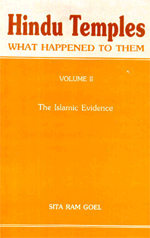|
 Page 1
Page 1
We return to the Marxist professors with whom we started.
We have cited from eighty histories written by Muslims over a period of more than one thousand years. We have also cited several Islamic inscriptions which confirm what the historians say. The citations show how Hindu temples continued to be destroyed over a vast area and for a long time. We have added no “editorial comments” and given no “communal twist” to the events that took place. All along, we have kept to the actual language used by the Muslim historians.
We wonder if the professors will dismiss as “a mere listing of dates” the evidence we have presented. What we expect from the professors is that they will come forward with “historical analysis and interpretations” so that the destruction of Hindu temples mentioned in the Muslim narratives gets explained in terms of economic or political or any other non-religious motives.
We stick to our position, namely, that it is the theology of Islam which offers the only straight-forward and satisfactory explanation of why Muslim conquerors and rulers did what they did to Hindu places of worship. We have provided full facts about that theology, as also about the history of how it took its final shape. It would be most welcome if the professors come out with their comments on the character and meaning of this theology. In fact, we look forward to a Marxist explanation of it. What were the concrete material conditions and objective historical forces which gave rise to this theology in Arabia at that time?
Next, we refer to the second point which the professors had made in their letter to The Times of India. They had said that “acts of intolerance have been committed by followers of all religions”. A subsequent sentence clarified what they meant; they had in mind the “Buddhist and Jain monuments” and “animist shrines destroyed by Hindus”. As we have said, we do not share their philosophy of separating the Buddhists, the Jains and the Animists from the Hindus. But we agree to use their terms for the time being and request them to produce
About Author : Shri Sita Ram Goel
|